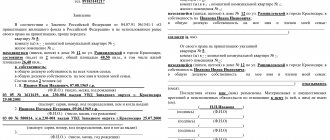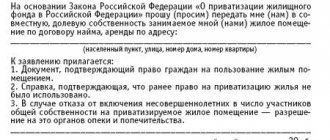Invalidation of privatization is not a frequent but important legal operation. It is believed that privatization is the safest way to become the owner of a living space. It seems that there should be no fraud or problems in this area. But there are skillful scammers who take advantage of people’s gullibility and take away their real estate. There are also cases where the privatization process was carried out with violations and obvious infringement of the interests of the homeowner. But the privatization agreement can be challenged. How and on what basis? All the most interesting details are in the article.
What it is?
Privatization is the re-registration of rights to real estate occupied by citizens on social rental terms; accordingly, illegal privatization refers to the registration of a real estate property at the disposal of a federal or municipal government authority, i.e. someone else's property, the property of Russians, performed in bad faith.
Unfair implementation means a violation of at least one standard prescribed by law. For example, privatization that was carried out in violation of property rights or with the participation of citizens who do not have the legal right to perform this procedure in the Russian Federation will be considered illegitimate.
Important! The privatization process with all the principles is formulated in the relevant law of the Russian Government No. 1541-1.
Among the principles we highlight the following:
- A citizen has the opportunity to apply for renewal of rights once.
- The privatization program is available to all citizens of the Russian Federation.
- It is a gratuitous transfer of an object.
Common violations in the field of privatization in Russia are:
- Infringement of the rights and legitimate interests of third parties.
- Errors in the procedure itself.
- Violation of the law.
- Criminal intent of privatization.
- Fraud.
Is it possible to challenge the transaction?
In Russia, the law provides for the possibility for a citizen to invalidate the registration of ownership of an apartment. The main condition remains the presence of compelling reasons for this, supported by documents.
The Law “On the Privatization of Apartments” mentioned above indicates possible grounds for challenge.
- Citizens who previously lived in the apartment, but were not included in the privatization agreement, are turning to the court.
- A challenge is possible if any of the adults exercised the right to privatization again, if the minor citizen registered in the apartment was not included in the privatization agreement (the participation of children is mandatory).
- Individuals who are faced with the signing of an agreement by a citizen without authority, forged documents, recognition of one of the parties to the transaction as incompetent, misleading the participants in the privatization and, finally, the commission of a legal action under duress have the opportunity to go to court.
Watch a video about whether privatization can be challenged:
Is it possible to challenge privatization?
When can this be done?
A citizen whose rights have been violated has the opportunity to file a lawsuit to declare privatization invalid within three years, according to Article 196 of the Civil Code of the Russian Federation. This period is considered general civil and is applied to so-called voidable transactions (recognized as invalid not by the fact of the conclusion itself (void), but only by a court decision).
If legal inconsistencies with the law become clear during the process of re-registration of property rights, you can exercise the right to suspend privatization. The process is suspended at any stage, but no later than the state registration of property rights. To begin the procedure, a citizen must document the presence of conditions that prevent the legal execution of the transaction.
Finally, the state registrar has the right to independently initiate a suspension of the process if he has doubts about the legality of the transaction , the authenticity of documents, and so on.
Reference! Before registering the ownership rights of individuals to a privatized apartment in Rosreestr, a citizen has the right to initiate a review of the terms of the transaction; after registration, a person can defend his rights only in court by filing a claim to invalidate the privatization.
Reasons
Privatization is a transaction concluded between the state and citizens of the Russian Federation in order to transfer ownership of property belonging to the Russian Federation.
In this regard, the grounds for cancellation of this transaction are the same as with other types of contracts.
Cases of cancellation of the process of transfer of ownership include the following cases:
- Mandatory terms of the transaction contradict the norms established by law regarding the content of the contract.
- The results of the concluded agreement violate the norms of morality, ethics and rules of legal order in society.
- The transaction is imaginary, so the transfer of ownership was not carried out in reality.
- The contract is a sham (concealing another transaction).
- The transaction is concluded by a person who previously participated in privatization. Since you can only participate in the privatization procedure once in your life, repeated participation is illegal. If such circumstances are identified, the property is transferred back to the previous owner (municipal or state). Exceptions are cases where a person has previously signed a waiver of participation in a previous privatization.
- The contract was concluded by persons who are legally incompetent, who are medically incompetent, or who are recognized as such in court. These may also include alcoholics and drug addicts.
- The components of the agreement violated the rights of persons under the age of majority and other citizens.
- The parties to the privatization signed the agreement under duress, were misled or were victims of fraudulent actions.
- One of the parties to the transaction was a minor. It is worth noting that the law allows minors to participate in such transactions. Exceptions are cases when they were excluded from privatization without the consent of the guardianship, the agreement was signed by a child under fourteen years old or a child from fourteen to eighteen years old without the permission of at least one of the parents.
- One of the parties to the transaction is a person who is not registered in the privatized residential premises. Exceptions include military personnel and prisoners.
How can a contract be declared illegal?
Where to contact?
The courts deal with cases of invalidation of privatization agreements. The Code of Civil Procedure of the Russian Federation states that such claims are considered by district courts. According to Article 30 of the Code of Civil Procedure of Russia, a citizen who wishes to recognize a privatization transaction as invalid and cancel it must apply to the court at the location of the real estate with a statement of claim and a package of documents.
If a challenge is planned in relation to a transaction to which a legal entity was a party, then such claims fall within the competence of the Arbitration Courts.
Documentation
The composition of the documents required to file a claim largely depends on the violation with which the plaintiff plans to go to court. For example, in order to prove the unlawful exclusion of a citizen from among the participants in a transaction, you will need to submit documents confirming the rights to use the apartment on social rent terms.
The standard list of documents for challenging , for example, the non-inclusion of a person in a privatization agreement, includes:
- Proof of the person’s rights to challenge privatization (papers confirming the conclusion of a social tenancy agreement and living in a privatized apartment).
- A document about the nature of the violation of his rights.
- Copies of documents indicating a violation of the law (for example, a registered privatization agreement in which the plaintiff does not appear as a participant in a real estate transaction).
- Receipt of payment of state duty (350 rubles).
- Statement of claim.
How to make an application?
Attention! The statement of claim is drawn up according to the sample, but it is not necessary to use a specialized form for it.
The document consists of three parts:
- hats;
- main part;
- details of the plaintiff, entered at the bottom of the page.
Writing instructions:
- In the first line (the upper right corner of an A4 sheet is used for the header), the name of the court is entered, where the plaintiff submits an application in the form: “B - name of the locality - district court - name of the region - region.” From the next line the surname and initials of the plaintiff are indicated, below - the address, phone number and email of the plaintiff.
- The plaintiff is indicated in the header of the statement of claim, and in the form - last name, initials, address, telephone and email.
- Next, enter the title of the document, namely: “Statement of Claim for recognition of the right to privatize residential premises.”
- After this, the plaintiff is required to refer to legislative standards, in accordance with which he demands recognition of his right. They will be Article 2 of the Law “On the Privatization of Housing Stock in the Russian Federation”, Articles 131 and 132 of the Civil Procedure Code of the Russian Federation.
- The claim is drawn up in the form: “I ask you to recognize the right to privatization,” indicating the address of the property and its cadastral number. The application also indicates the documents proposed for consideration of the case; they are included in the column.
- At the bottom of the page, the plaintiff puts his signature and enters the date the application was submitted.
Statute of limitations
The plaintiff has the right to challenge the transaction within three years on the general grounds prescribed in Article 196 of the Civil Code of the Russian Federation for contested transactions. If individuals who were minor children at the time of privatization want to defend their rights, the statute of limitations is counted when citizens reach the age of eighteen, and not from the date of the privatization of the property itself.
It is important to take into account that cases in which unlawful physical actions against a party appear, for example, the plaintiff goes to court because he was pressured during the privatization of an apartment, are considered only within one year.
Advantages of resolving the issue of challenging the results of privatization
- by filing a lawsuit and resolving the case with the involvement of a lawyer, you will be restored to your rights to your legal property, no one will be able to claim your share of the occupied premises;
- you will get peace of mind regarding your life plans and will be able to dispose of the property the way you want - sell, donate, bequeath or resolve the issue in another way;
- in the end, you will simply have your own home, and you will come to an agreement in resolving the family dispute.
Author of the article: © lawyer, managing partner of the law firm “Katsailidi and Partners” A.V. Katsaylidi
Share
How to restore the past deadline?
It happens that the plaintiff, for some reason, learns about the privatization after three years have passed . In judicial practice, another method is used to count the limitation period - just for such cases - from the moment the plaintiff is notified.
But even if a citizen whose rights have been violated does not have the opportunity to prove that he did not know about privatization, no one deprives him of the right to go to court. In this case, the judge can refuse to satisfy the claim only on the initiative of the defendant, if this party to the proceeding makes a request.
There is one more nuance in the law of the Russian Federation - holding a court hearing without summoning the defendant to court , but what to do if a party to the process still wants to attend the hearing? Article 203 of the Civil Code of the Russian Federation notes that the limitation period may be interrupted if the person against whom the plaintiff has claims admits them. In other words, if the plaintiff has evidence that the defendant promised him to independently resolve the privatization issue.
This circumstance fully justifies the reluctance of the party whose rights have been violated to go to court in the hope of a peaceful resolution of the issue. If the plaintiff has such a certificate/receipt in hand, issued, for example, three years after privatization, then the new limitation period is counted from the date indicated in it.
Important! Article 205 of the Civil Code also provides for the possibility of reinstating the statute of limitations if the plaintiff provides a valid reason.
Consider the list of reasons specified in the above document:
- Serious illnesses (not the diagnosis itself is taken into account, but the specifics of the treatment of the disease. For example, persons who were in a hospital and citizens who were limited in movement at that time can count on restoration of the term).
- Unstable mental state (use of drugs, alcohol, drugs with psychotropic effects, hypnosis).
- Family circumstances (illness, death of a family member).
- For citizens of other countries or those living in the territory of other countries, the court will consider the following reasons to be valid: ignorance of the Russian language or Russian legislation, illiteracy, lack of awareness of legal issues.
- Residence in another region for reasons independent of the plaintiff, stay in prison.
- Unknown location of the defendant.
Reinstatement applies to cases where a valid reason occurred in the last six months of the three-year claim period, in which case the court takes into account that the plaintiff may not have had time to go to court. To restore the deadline, the plaintiff submits a separate application to the court, attaching papers illustrating the existence of the reasons.
Invalidity when a transaction is made under the influence of misconception, threat, deception or violence
According to the provisions of Law No. 1541-1, the decision to participate in the privatization program must be free and voluntary; any coercion to complete a transaction, as well as influence on the will of residents, is unacceptable. If employers make a decision under the influence of third parties, including when expressing threats or violence, the guilty citizens will be held accountable, and the transaction will be declared invalid.
In the same way, a privatization transaction made under the influence of misconception or deception, including on the part of the other residents of the apartment, will be challenged. Challenging on these grounds is carried out in the courts at the request of authorized bodies or the entity whose rights were violated.
Legal consequences
Satisfaction of the claim will entail the termination of the privatization agreement and the annulment of the transaction itself. Based on the court decision, Rosreestr will exclude information about the right from the Unified State Register, and the property will return to municipal ownership. The defendant may also be held liable for possible losses caused by his actions to third parties.
Despite the fact that the procedure for annulment of privatization includes many stages and involves defending interests in court, affected persons have the opportunity to invalidate the privatization and defend their property rights. You must contact the regional court and attach documents proving your interest and rights to the property.
If you find an error, please select a piece of text and press Ctrl+Enter.
Privatization and registration at the place of residence
Opportunity to participate in the privatization of a subtenant’s apartment
My brother lives with me, who is registered in my apartment temporarily. Can I privatize an apartment without his participation, or should I wait until his registration expires?
Privatization of an apartment. How to discharge a relative?
Three years ago I registered a relative with me. Omsk registration, as he explained to me, he needed in order to get a job in our city. Now I want to privatize the apartment. Is it possible to discharge a relative and how to do this, since he did not even live in my apartment for a day?
They refuse to privatize the apartment - I have to prove that I moved in as a family member
A year ago my grandmother registered me at my place of residence; she recently died. They refuse to privatize this apartment, citing the fact that I need to prove that I moved in there as a member of my grandmother’s family. Is the refusal legal?
They require a written refusal to privatize from a family member who has moved to another place of residence
We want to privatize the apartment. Is it legal for the municipality to provide a written refusal to privatize a family member who a month ago moved to another place of residence and was deregistered?









